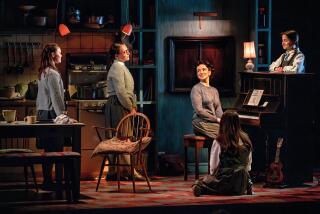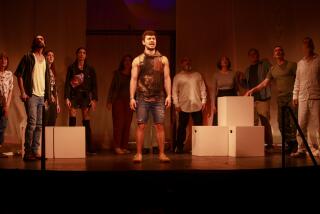Terrorism Play Hits Home at Old Globe
SAN DIEGO — After the play had ended, the crowd filed out quietly. Few chose to leave right away. Most stood by and talked. Words such as “Reagan,” “Kadafi,” “Libya,” “terrorism” were heard muttered in almost every nervous exchange.
No one talked about the weather, which was blindingly hot. Either they talked about the play, “Cat’s-Paw” by William Mastrosimone, or the cast, which was excellent, or the events of April 14, when U.S. planes bombed Libya.
“Cat’s-Paw” deals with terrorism, specifically the motives of a terrorist hit squad--made up entirely of Americans--who seize a hostage, take over a building and explode a car bomb in the shadow of the White House.
Mastrosimone writes of the role of the media in terrorism (an agent of exploitation?), of how a hostage might respond, and of the forces that drive otherwise committed care-givers to take up violence--in the context of terrorism--as a way of reaching political aims.
The play opened at the Cassius Carter Centre Stage in Balboa Park March 22 and continues through May 4. It was recently transferred from the Seattle Repertory Theatre, where it originated. Mastrosimone, who lives in Seattle, hopes to take the play to Los Angeles and maybe New York.
His timing couldn’t be better.
Amy Caton-Ford, who plays one of the terrorists in “Cat’s-Paw,” said she had noticed a marked change in reactions from the audience--and in her own emotions--since the air raids on Libya.
“For me, a drastic change,” she said. “(The raid) happened Monday, and Tuesday was a very different day. I felt enormously different acting. I kept thinking, ‘Terrorism is wrong. It is just wrong .’ I kept having to fight that feeling while playing the character.”
Caton-Ford said words from the script, such as “tanks at the White House,” now evoke a new meaning. And a new reaction.
“I can see everything so clearly,” she said. “Maybe too clearly,” she added with a laugh.
John Procaccino, who excels as Victor, the leader of the terrorist group, said “tanks at the White House” had brought audible gasps from the audience--but only since the Libyan raid. Other lines, which drew gallows laughter before April 14, have given way, he said, to a kind of stunned silence, “a somberness.”
Concentration Level at Peak
“The concentration level of the audience has been at an absolute peak every night this week,” he said on Sunday. “The crowd is much more in tune with what’s going on. They watch and listen with incredible attentiveness.”
Fear was a common emotion among many of those interviewed after the Sunday matinee, an audience made up largely of senior citizens. (The Sunday evening crowd, which Procaccino said is generally “more Yuppie-ish,” also was polled, offering many of the same reactions.)
Several commented that the country had “better act fast,” speaking not of terrorism, nor of making the media more ethical, but of cleaning up the water supply--the complaint of the “Cat’s-Paw” terrorists.
Mastrosimone, interviewed by telephone from Seattle, said he didn’t really intend to write a play in which the audience identifies with the terrorists or their cause, a psychological condition known as “the Stockholm Syndrome.”
In some cases, that appears to be what happened with Sunday’s packed houses, which may have taken the “captive audience” label to a new dimension.
A middle-aged woman named Deen Schrempf said she found the acting “tremendous,” albeit in “a very violent play”--one that made her think: “We’ve got to start cleaning up the water! It was really scary.”
Asked what was scary, she replied: “The fact that our water’s so bad.”
Her reaction--appearing to sympathize with the terrorists’ views--was shared by at least half a dozen other people.
“The contamination of our water supply, that’s what’s terroristic,” said Norman Woodbury, who drove in from the desert town of Hesperia.
Mastrosimone was skeptical about having drafted a play in which the Stockholm Syndrome seizes an audience.
“I would be honored if able to write a play so powerful,” he said, “one that made people fall into the syndrome (which some say happened to Patty Hearst during her captivity). That would have to take place over weeks. In two hours, it can’t readily happen.”
He said he picked water, wanting an American topic. (His message is primarily terrorism, he said, not clean water.) He wanted an American group, an American setting, American media. To write a play about a Mideast terrorist group terrorizing Americans would have brought little reaction.
“People already know what they think about that,” he said. “I wanted them to really think.”
Terrorism Seen as Unavoidable
Many in the audience said terrorism, within American boundaries, is now unavoidable. If thinking it will happen is indicative of a self-fulfilling prophecy, this crowd had the bombs going off. Only the time and place are a mystery, waiting to be revealed by a network news bulletin.
“After last week,” said grandmother Natalie Klicman, “there’s no way to avoid it here. We’ve been unusually fortunate up to now. The honeymoon is over. They’ll start reaching into America forthwith.”
One man, who asked not to be quoted by name, said he supported the American raid--until a day had passed. With time to think about it, he said, he realized “we are really in the (manure) pile now.”
Klicman said her 13-year-old granddaughter had not stopped asking about the raid since it happened. She wants to know who Kadafi is, why President Reagan did what he did and most of all why Reagan kills babies.
“I thought the play was really scary,” she said. “All it did was bring home the horror of the past week. I don’t know what I’d do in such a situation. I don’t know what anyone can do. Terrorism leaves you with a feeling of hopelessness and despair.”
Jack Gallagher, a friend of Natalie Klicman, scoffed at her saying her grandchildren couldn’t understand Reagan’s action.
“Yeah, well, they don’t remember (Neville) Chamberlain,” he said. “They don’t remember Czechoslovakia or Poland.” Chamberlain was the British prime minister before and in the early years of World War II, and his policy of appeasement toward Adolf Hitler did little to keep Germany from invading those two countries.
Gallagher was one of five people Sunday who asked to see proof that a writer from The Times was who he said he was.
“Do you have a press card or a business card I can see?” he said. (Gallagher was the only person, of 25 interviewed, who said he supported the President’s action.)
The media are one of the play’s big targets--maybe the biggest. One night, after a recent show (a pre-raid performance), the cast held a question-and-answer session with the audience. The answerer was Susan McBride, a newswoman with KGTV (Channel 10), San Diego’s ABC network affiliate. Apparently, McBride ended up feeling attacked, having to field hostile questions and defend the media’s actions in covering terrorist situations.
Kit Flanagan, who plays the part of TV reporter Jessica Lyons, said that although the character changes in the play, ending up as a kind of heroine, she as an actress now knows a truth: In terrorism, the media--in particular television--are indispensable.
“You realize, for the most part,” she said, “that terrorism is done for the media. And you wonder, without it, if terrorism . . . would even exist.”
Many in the audience took pains to note, however, that terrorism arouses contradictions, for the most part grossly painful contradictions. The play did that for them. It inflames ambivalence, even in its victims. Flanagan, hardly an anti-media spokeswoman, said the media can scarcely go away. Maybe they’re as paralyzed as anyone else.
Dot, a woman who asked that her last name not be published, said terrorism wouldn’t exist if its perpetrators didn’t feel “so impotent.”
Ironically, that is the feeling it arouses in victims, in onlookers and, she said, in any idealist hoping to somehow scratch at the root of its causes. A liberal, well-read woman, she too, wondered what would happen if the media could muster the courage to ignore The Big Story.
“It’s like a tree falling in the forest,” she said. “If no one is around to hear it, to see it, well. . . . Did it fall?”
More to Read
The biggest entertainment stories
Get our big stories about Hollywood, film, television, music, arts, culture and more right in your inbox as soon as they publish.
You may occasionally receive promotional content from the Los Angeles Times.










